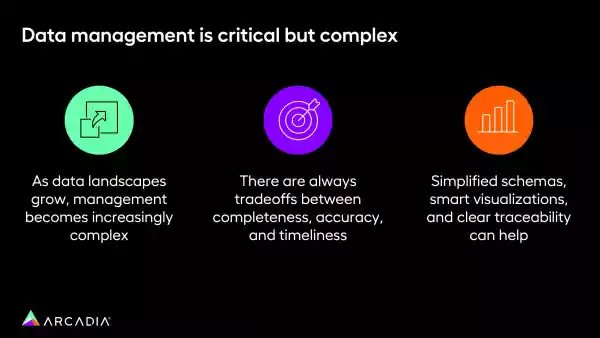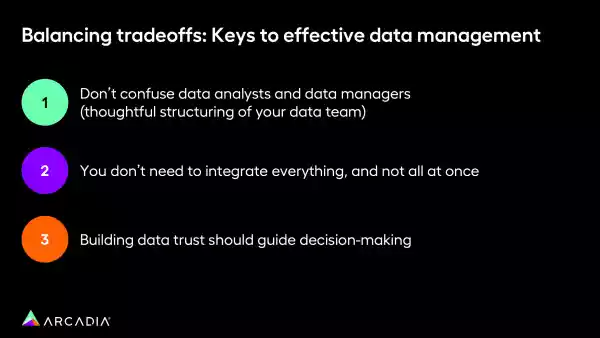Healthcare data management software and strategies
Healthcare data management software provides insights to improve operational efficiency and patient outcomes. In Arcadia’s byte-sized insight series, Christine Knox, Senior Solution Engineer, and Stephanie Orosz, Technical Solution Architect, review these tools and how they can improve your organization’s decision-making.
Navigate the complexity of data management in healthcare
Data management in healthcare is critical, but complex. As healthcare organizations accumulate more data, managing it becomes more difficult. Without proper data governance from the start, organizations risk putting bad data in and getting bad data out.
To master data management, there are three key areas to consider in your strategic approach:

Data management becomes more complex as its volume grows
The volume, variety, and velocity of data can overwhelm traditional management systems. This makes it difficult to ensure data is accurate, timely, and accessible. Data complexity requires advanced tools and strategies to handle the growing data landscape. This enables providers to leverage data for better decision-making and improved patient outcomes.

This is no shock — data is critical, but it can also be a mess. There’s unstructured data, and there’s structured data, and many people know the pains of those systems that don’t allow these types of data to talk to each other.
Trade-offs exist between completeness, accuracy, and timeliness
In data management, there is a constant balancing act between completeness, accuracy, and timeliness. High accuracy may require more time for validation and verification, potentially delaying access to data. But, prioritizing timeliness might result in slightly less accurate data.
Healthcare organizations need to find an optimal balance that meets their specific needs. This will ensure that data is accurate enough to be reliable while also being available when needed.
Simplified schemas, smart visualizations, and clear traceability can help
Simplified schemas streamline data models, making the integration and management of diverse sources easier. Smart visualizations turn complex data into easily digestible formats, enabling healthcare leaders to quickly gain insights and make informed decisions. Clear traceability ensures end users can track data to its source, providing transparency and accountability.
These tools and strategies collectively enhance the efficiency and effectiveness of healthcare data management.
Balancing trade-offs: 3 tips for effective data management
Effective data management in healthcare is a balancing act with many trade-offs. Here are three key tips to navigate your data complexities:

1. Clarify roles and responsibilities
One critical step to effective data management is understanding the roles of data analysts and data managers. Data analysts focus on interpreting data, uncovering insights, and providing actionable recommendations. They can significantly impact decision-making processes.
Data managers are responsible for the integrity, accessibility, and security of data. They oversee the systems used to collect, store, and retrieve data. This is to ensure accuracy and availability. By clearly defining these roles within the organization, healthcare leaders can leverage the unique skills of each group, leading to more efficient and effective data management practices.

I’ve seen organizations that try to have folks wear multiple hats. The data analysts end up spending so much of their time cleaning and wrangling data, which means there is less time spent on driving insights.
2. Adopt a phased approach to data integration
A common misconception in data management is the need to integrate all data sources at the same time. This can lead to significant challenges and inefficiencies. A phased approach where users can identify the most critical data sources for integration is recommended. This allows healthcare organizations to build a robust data infrastructure over time that supports their goals and enhances data-driven decision-making.
3. Improve decision-making through data trust
Data trust is a cornerstone of effective data management. Ensuring the accuracy, completeness, and timeliness of data is essential for making informed decisions. This involves implementing rigorous data validation and verification processes. Trustworthy data enables confident decision-making and reduces the risk of errors.
Creating a transparent and accountable culture in the organization can also increase data trust. By doing so, healthcare organizations can ensure that their data management practices are robust and reliable, and create better health outcomes.
Top 3 healthcare data management tools
Choosing the right data partner is crucial for enhancing data trust. They can provide the necessary tools and expertise to manage data effectively and also provide valuable insights.
1. Data integration platform
Integration is a crucial step in the healthcare data management process that involves aggregating information from various sources while balancing interoperability with data privacy. Healthcare data management software provides a unified platform for combining and organizing data, making it an indispensable tool for effective management.
Data integration platforms are designed to aggregate data into a central repository. Built upon robust data warehouses, these solutions allow users to break down data siloes and glean insights from various sources.
2. Data analytics technology
Analytics in healthcare refers to the process of modeling and examining data to clean data to draw useful conclusions and drive informed decision-making. To successfully evaluate existing repositories of health data, innovative provider data management software is key.
Analytics software applies data algorithms, including AI and machine learning technologies, to supplement raw data with accurate insights. This technology relies on effective data collection and integration to facilitate powerful analysis.
The right solution pairs analytics with actionable tools for effective patient care. For example, chronic care management tools enable providers to act on data analysis by updating care plans and exchanging information with other providers.
3. Comprehensive data collection, management, and analytics software
Arcadia's Console is a powerful tool designed to provide transparency and control over healthcare data management processes. One of the standout features of Console is its ability to track and display the status of data at every step. This ensures users are always informed about the condition of their data feeds.
Console provides detailed information such as the type of file, when the file entered the system, and any potential issues, such as changes in file formats. This transparency helps users understand the flow and status of their data. It also allows them to set customizable tolerances for data delays, recognizing that some data can afford to be late while others cannot.
Ultimately, Arcadia takes on the responsibility of ensuring data accuracy and timeliness, but Console empowers users with the knowledge they need to stay informed and make better business decisions. This level of transparency and accountability is crucial for maintaining data trust and supporting effective data management strategies.
Healthcare data management tools unlock success
Data management plays a crucial role in streamlining healthcare operations. Partnering with the right data analytics provider can enhance data trust, giving healthcare leaders the confidence to make informed decisions and streamline operations. By adopting these practices, healthcare organizations can ensure they are well-equipped to handle the complexities of today’s healthcare.
Watch more byte-sized insights or request a demo to learn how we can safeguard your data, together.
